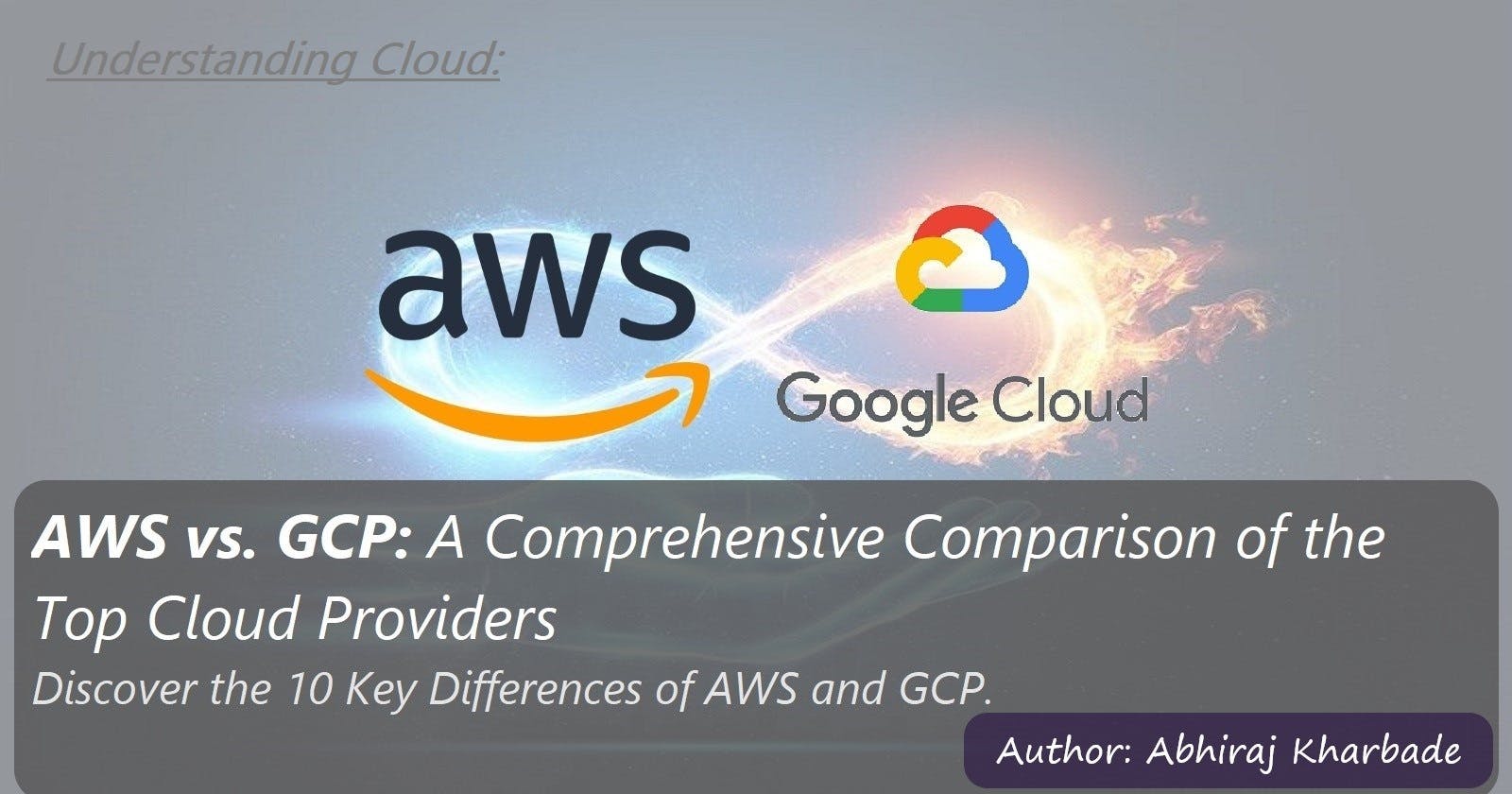AWS vs. GCP: A Comprehensive Comparison of the Top Cloud Providers
Discover the 10 Key Differences of AWS and GCP.
Introduction:
When it comes to cloud computing, Amazon Web Services (AWS) and Google Cloud Platform (GCP) are two of the most popular cloud service providers in the market. Both AWS and GCP offer a wide range of cloud services that cater to the needs of businesses of all sizes. In this blog, we will compare 10 major services of AWS and GCP and see how they stack up against each other.
Basic Comparison:
AWS and GCP offer similar cloud computing services, but their approach to cloud computing is different. AWS is known for its robust infrastructure, while GCP is known for its cutting-edge technology and tools. AWS has been in the market longer and has a larger market share, while GCP is known for its innovation and ability to provide value to businesses.
Content:
1. Compute Services:
AWS offers Elastic Compute Cloud (EC2), which is a web service that provides scalable computing resources in the cloud. GCP offers Compute Engine, which is a virtual machine that runs on Google’s infrastructure. Both services offer a variety of instance types, from small to large, and allow customers to customize the instance configurations.
2. Storage Services:
AWS offers Simple Storage Service (S3), which is a highly scalable object storage service that provides customers with the ability to store and retrieve large amounts of data. GCP offers Cloud Storage, which is also an object storage service that provides customers with the ability to store and retrieve data. Both services offer a range of storage classes, from standard to archival, and provide customers with the ability to manage data lifecycle policies.
3. Database Services:
AWS offers a range of database services, including Relational Database Service (RDS), DynamoDB, and Aurora. RDS is a managed database service that supports several relational database engines, including MySQL, PostgreSQL, Oracle, and SQL Server. DynamoDB is a NoSQL database that provides low-latency, scalable performance. Aurora is a MySQL-compatible database engine that provides high availability and automatic failover. GCP offers Cloud SQL, which is a managed database service that supports MySQL, PostgreSQL, and SQL Server. GCP also offers Cloud Spanner, which is a globally distributed, scalable, and strongly consistent relational database.
4. Networking Services:
AWS offers Virtual Private Cloud (VPC), which is a virtual network that provides customers with the ability to launch resources into a virtual network that they define. AWS also offers Elastic Load Balancing (ELB), which automatically distributes incoming traffic across multiple targets. GCP offers Virtual Private Cloud (VPC), which is also a virtual network that provides customers with the ability to launch resources into a virtual network that they define. GCP also offers Load Balancing, which automatically distributes incoming traffic across multiple targets.
5. Container Services:
AWS offers Elastic Container Service (ECS), which is a container management service that allows customers to run Docker containers on a managed cluster of EC2 instances. AWS also offers Elastic Kubernetes Service (EKS), which is a managed Kubernetes service that allows customers to run Kubernetes clusters on a managed cluster of EC2 instances. GCP offers Kubernetes Engine, which is a managed Kubernetes service that allows customers to run Kubernetes clusters on Google’s infrastructure.
6. Serverless Services:
AWS offers Lambda, which is a serverless compute service that allows customers to run code without provisioning or managing servers. AWS also offers API Gateway, which is a fully managed service that makes it easy for developers to create, publish, maintain, monitor, and secure APIs. GCP offers Cloud Functions, which is a serverless compute service that allows customers to run code without provisioning or managing servers. GCP also offers Cloud Endpoints, which is a fully managed service that makes it easy for developers to create, deploy, and manage APIs.
7. Machine Learning Services:
AWS offers a range of machine learning services, including Amazon SageMaker, Amazon Rekognition, and Amazon Polly. SageMaker is a fully managed service that allows developers to build, train, and deploy machine learning models at scale. Rekognition is a service that provides image and video analysis capabilities, such as face detection and recognition. Polly is a service that converts text into lifelike speech. GCP offers Cloud AI Platform, which is a suite of services that allows customers to build and deploy machine learning models. It includes services such as AutoML, which allows developers to build custom machine learning models without extensive knowledge of machine learning, and Vision API, which provides image analysis capabilities, such as object detection and recognition.
8. Security Services:
AWS offers a range of security services, including Identity and Access Management (IAM), Key Management Service (KMS), and CloudTrail. IAM allows customers to control access to AWS services and resources. KMS allows customers to create and manage encryption keys used to encrypt and decrypt data. CloudTrail is a service that logs API activity and provides visibility into AWS resources. GCP offers a similar range of security services, including Cloud Identity and Access Management (Cloud IAM), Cloud Key Management Service (KMS), and Cloud Audit Logs. Cloud IAM allows customers to control access to GCP resources. Cloud KMS allows customers to create and manage encryption keys used to encrypt and decrypt data. Cloud Audit Logs provide visibility into GCP resources.
9. Analytics Services:
AWS offers a range of analytics services, including Amazon Redshift, Amazon Kinesis, and Amazon Athena. Redshift is a data warehousing service that allows customers to store and analyze large amounts of data. Kinesis is a service that allows customers to collect, process, and analyze real-time streaming data. Athena is a service that allows customers to run ad-hoc SQL queries on data stored in S3. GCP offers a similar range of analytics services, including BigQuery, Dataflow, and Dataproc. BigQuery is a data warehousing service that allows customers to store and analyze large amounts of data. Dataflow is a service that allows customers to collect, process, and analyze real-time streaming data. Dataproc is a service that allows customers to run Apache Hadoop and Spark jobs on a managed cluster.
10. DevOps Services:
AWS offers a range of DevOps services, including CodeCommit, CodeBuild, and CodeDeploy. CodeCommit is a managed source control service that allows customers to store and version control their code. CodeBuild is a service that allows customers to build and test their code. CodeDeploy is a service that automates code deployments to any instance, including EC2 instances and on-premises servers. GCP offers a similar range of DevOps services, including Cloud Source Repositories, Cloud Build, and Cloud Deploy. Cloud Source Repositories is a managed source control service that allows customers to store and version control their code. Cloud Build is a service that allows customers to build and test their code. Cloud Deploy is a service that automates code deployments to GCP resources.
Conclusion:
AWS and GCP offer similar cloud computing services, but their approach to cloud computing is different. AWS has been in the market longer and has a larger market share, while GCP is known for its innovation and ability to provide value to businesses. In terms of services, both AWS and GCP offer a wide range of cloud computing services that cater to the needs of businesses of all sizes. When choosing between AWS and GCP, it is important to consider your business needs, budget, and the specific features and capabilities of each service.
Please share your thoughts and opinions on this topic in the comments section below.
The above information is up to my understanding and learning experience. Suggestions are always welcome.
~Abhiraj kharbade
#DevOps #AWS #GCP #amazon
Connect with me :

